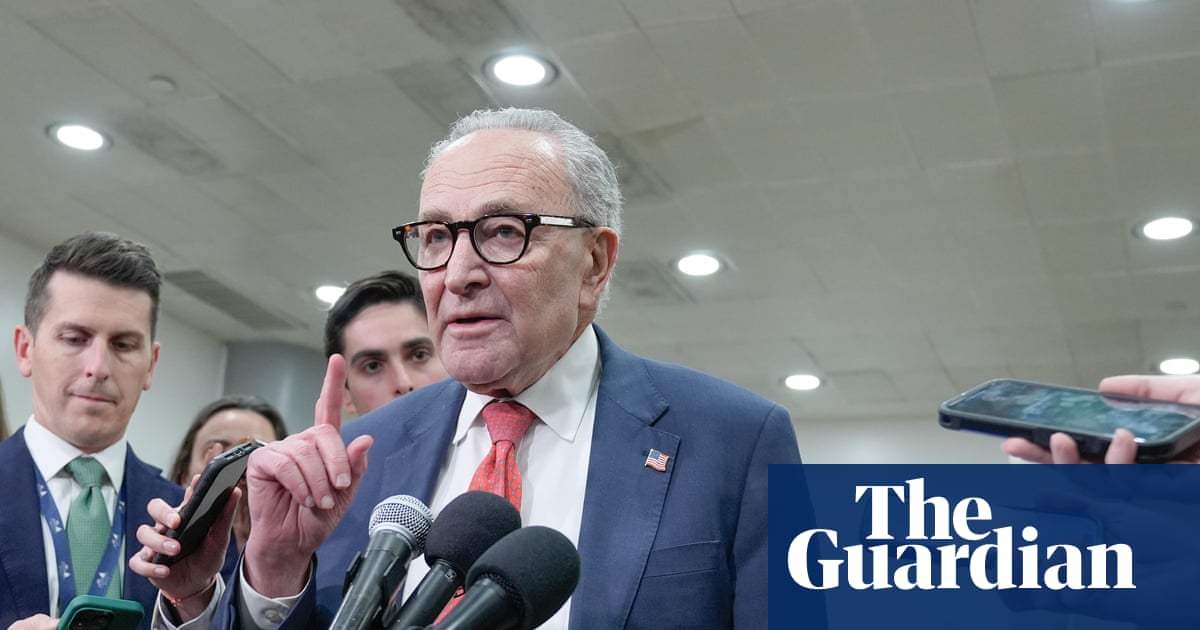Democrats are furious after it emerged that eight members of their Senate caucus worked with Republicans on a compromise to end the longest government shutdown in US history — and won none of the healthcare concessions they had sought.
Senate minority leader Chuck Schumer, who led Democrats’ weeks‑long stand against reopening government without an extension of tax credits that lower Affordable Care Act premiums, has drawn the most criticism. Though Schumer does not publicly back the compromise, lawmakers and Democrat‑aligned groups have attacked his leadership and called for his resignation.
“Last night, eight ‘moderate’ Democrats got played. Conned. Rooked. Pantsed. Pumped and dumped. Rode hard and put away wet,” wrote ex‑Republican strategist Rick Wilson, adding it was “a colossal leadership failure” and that Schumer should resign “if he had a shred of honor or shame.”
Progressive groups echoed that sentiment. Our Revolution executive director Joseph Geevarghese said Schumer “should step down as Senate minority leader immediately,” charging that if Schumer secretly backed the deal he lied, and if he couldn’t keep his caucus in line he was inept.
Three House Democrats have publicly called for Schumer to step aside. California Democrat Mike Levin said Schumer “has not met this moment and Senate Democrats would be wise to move on from his leadership.” Ro Khanna said Schumer “is no longer effective and should be replaced,” and Michigan Democrat Rashida Tlaib said he “has failed to meet this moment” and is “out of touch” with working people.
Yet none of the Senate Democrats who could force a leadership change have joined the calls, and House Democratic leader Hakeem Jeffries declined to remove Schumer, answering “yes and yes” when asked whether Schumer was effective and should keep his post. A Schumer spokesman did not respond to a request for comment.
The dispute revisits an earlier funding battle this year in which Schumer initially vowed to demand changes to a short‑term funding measure but ultimately voted for it alongside centrists, provoking backlash from the party base and liberal groups that called for new leadership. Schumer survived that fight and, during this latest standoff that lasted 41 days, worked with progressive groups on shutdown strategy.
Senate Republicans, led by John Thune, held a series of votes on GOP bills to reopen government that did not address ACA subsidies. In the House, Speaker Mike Johnson put members on recess to signal his party wouldn’t negotiate on the Democrats’ demands, and publicly accused Schumer of fearing a primary challenge from Alexandria Ocasio‑Cortez.
The compromise to reopen government funds agencies through January and promises Democrats a vote on extending ACA tax credits — with no guarantee the bill would pass the Senate or reach the House floor. Schumer said the deal failed to address the healthcare crisis and did not vote to advance the bill in a key procedural vote.
By Monday, Democratic officials began urging restraint. Suzan DelBene, chair of the Democratic Congressional Campaign Committee, reminded House members the DCCC was targeting dozens of Republican districts and urged them to hold vulnerable Republicans accountable in media outreach — effectively advising Democrats to refrain from attacking Schumer.
Progressive groups, however, pressed on. Indivisible urged supporters to call Democratic senators to demand new leadership, saying Schumer either “blessed this surrender, or was incapable of leading his caucus to hold the line.” Whether the party’s base will accept calls to stand down and let Schumer remain leader remains uncertain.






